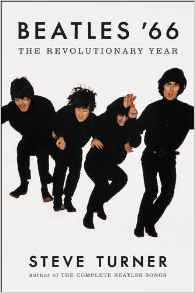 Steve Turner, Beatles ’66: The Revolutionary Year (New York: Ecco, 2016), 464pp.
Steve Turner, Beatles ’66: The Revolutionary Year (New York: Ecco, 2016), 464pp.
Review by David Werther
In Beatles ‘66, Steve Turner gives long overdue attention to the year when the Beatles released their first album masterpiece, Revolver, recorded the singles "Paperback Writer" and "Strawberry Fields Forever," and began work on what would became Sgt. Pepper's Lonely Hearts Club Band.
Beginning with December 1965 and ending with December 1966, Turner devotes a chapter to each of these thirteen months. With this expanded coverage of this pivotal period we gain a new appreciation for the Beatles' individual interests and inspirations, and their commitment to artistic growth. Turner details the end of the Beatles as a live act and the emergence of the band as studio musicians bent on breaking the boundaries of popular music.
When the Beatles played their last concert on August 29, 1966, at Candlestick Park, they finished up by harkening back to their rock and roll roots with Little Richard's "Long Tall Sally." In contrast, Revolver ended with "Tomorrow Never Knows," a song John wrote using a single chord, recorded with distorted vocal and tape loops, and opening with a line from a Timothy Leary paraphrase of the Tibetan Book of the Dead.
The Beatles could not have played "Tomorrow Never Knows" live, even if they had wanted. But, after tear gas and guard dogs in Germany, over 8,000 police officers keeping the peace and protecting them in Tokyo, a faux pas in the Philippines that led to John and Ringo being roughed up in the Manila airport, and the “more popular than Jesus” controversy plaguing them on their U.S. dates, the fact that they could not perform their new work live was irrelevant; they had no intention of touring again.
The Beatles had outgrown the world of fandom and entertainment. On tour, they could not hear themselves play their thirty-five minute sets. In the studio, with George Martin’s help, they could work unhurried, pushing the boundaries of the sounds and lyrics of popular music in songs like “Tomorrow Never Knows” and “Strawberry Fields Forever.”
Steve Turner notes, "From this distance it is hard to appreciate what a huge step the Beatles initially took by writing songs that were not about boy-girl relationships or youthful pursuits like dancing, driving and listening to music. Almost all previous pop music was about love or lust. Very occasionally . . . someone went beyond the boundaries, but even so these songs usually only expressed other forms of adolescent angst." (403). [Cf. Appendix B, where Turner lists the songs the individual Beatles had on their jukeboxes.]
Turner’s detailed description of the advances the Beatles made individually and collectively in 1966 is a fine addition to his three earlier works on the Beatles: The Gospel According to the Beatles (2006); The Complete Beatles Songs; and The Stories Behind Every Track Written by the Fab Four (2015).


